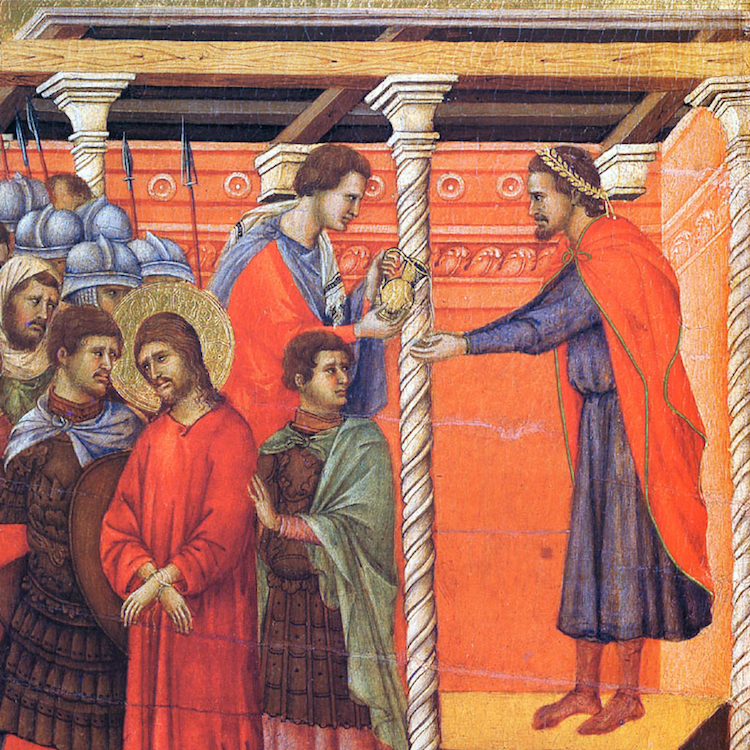American culture has made a fetish out of moderation. Our civic leaders tell us that we must favor the middle of the road on virtually every political and traditional moral issue. Racism, Choice and Climate Change allow for no such debates or compromise.
Their center lane Gospel of Moderation reminds me of a familiar biblical figure, the notorious Pontius Pilate. It was this Biblical Lady Macbeth, who provided a historic meaning to his personal hygiene. Caught between the crushing vice of his Jewish subjects and the fear of his Roman superiors, he adopted a moderate stance with regard to Jesus Christ.
Pilate’s dilemma was that he could find no fault in Jesus. His teachings were no threat to Pilate yet the Roman prefect of Judaea had Jesus scourged within an inch of his human life to appease his critics. As one could have easily predicted, Pilate pleased neither. As a result he took the coward’s way out. He washed his hands of the Prince of Peace giving both the world of Elizabethan drama and American cultural politics a perfect metaphor.
I sometimes wonder how many people realize that Pilate’s reliance on the “virtue” of moderation makes him the avatar of pro-choice advocates today? His act of moral indifference easily resembles our pro-choice politicians, who put their political ambitions above the sanctity of human life and the inviolability of the womb.
This especially holds true for the many pro-choice Catholic politicians who have pitted the abstract moderation of choice against the teachings of their Church and Her magisterium for the sake of their petty worldly ambitions. I say “abstract” because in reality the idea of a pregnant woman, actually exercising her choice for life does not enter into the equation of their thinking or their acceptance.
With so many Catholic Pilates to inspire them, it is not surprising that in the last two presidential elections a majority of Catholics have had little or no trouble in pressing the screen for the most virulently pro-abortion president in American history.
Many abortion advocates erroneously claim Jesus as their own in the name of choice. This near blasphemous fallacy calls to mind the special place Jesus had in his heart for all children. Were he to visit today, I do not think he would be pleased with the way we treat our children in this country. I can only imagine what he would say about killing life in the womb and the ecclesiastical pederasty scandal.
The brief glimpses we get of his human side in the Bible were highlighted by his encounters with children, underscoring his profound love for them. Jesus was very emphatic about what should happen to those who would harm a child in any way, especially sin. Such a man should have a millstone tied around his neck and cast into the sea. (Mark 9:42). I don’t think it would be much of a leap to apply this warning to those who are indifferent to the fate of children still in the womb. If so, there will not be enough millstones to go around.
As a result of the pro-choice establishment, American society has had mixed emotions about its children. To the pro-choice woman, it’s a baby when she wants it but a lifeless clump of tissue when she doesn’t. In effect modern pro-choice women now, not only have the power to give life, but also the wisdom to determine who and what is not alive. And what about those children who are allowed to live? These surviving “children of choice” are often treated like “imperial children,” with their parents catering to their every whimsical need. Our newspapers are filled with the mental illnesses, crimes and alienation of millions of these children.
Jesus’ innate condemnation of the moderation of choice is easily recognizable in Revelation: Since you are lukewarm, I will vomit you out of my mouth. (Revelation 3:15). His strong words of condemnation should give any 21st century Pilate pause for concern. To follow the middle of the road on the highway of life, especially with regard to the unborn, will invariably result in one being crushed by a semi trailer truck or run over by an SUV. It would be better to take the straight and narrow path on the secular highway, especially with regard to the most vulnerable of Jesus’ brethren.








